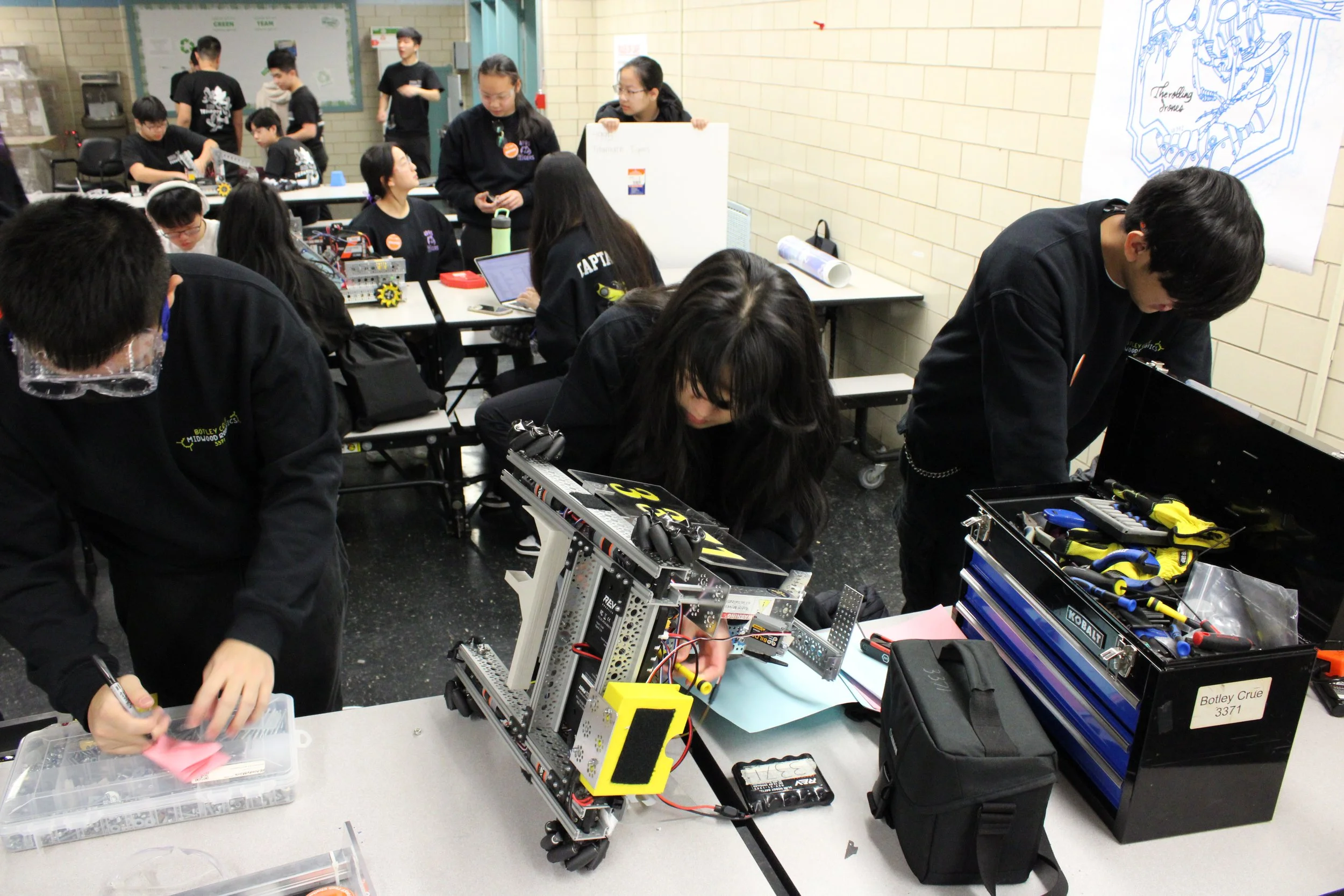Robotics Teams Roll into Super Qualifier
Amongst the bots’ challenges was firing a paper airplane for maximum distance. Photo: Hailey Zhu
By JERRY LI, NANCY LEI, BARNABAS JIANG, and JONATHAN HART
Midwood’s three Robotics teams – Pink Droyd, the Rolling Drones, and Bötley Crüe – rolled into the super qualifiers at John Dewey High School on February 3 after their success at the qualifiers at Francis Lewis High School in January. Unfortunately, the teams were unable to progress to the championships, ending their streak of victories.
The robotics competition changes every year, and this year’s game was called “Centerstage.” It consisted of five rounds, each with challenges including a pull up test done by robots, distance traveled from a paper airplane thrown by a robot, and a game of hexagon elements where robots pick up pixels to score on backdrops.
During robotics competitions, alliances are a key factor. Schools are paired with one another to score as many points as they can. Alliances can also be detrimental, since both teams will be penalized if one team earns a penalty. Usually Midwood’s teams compete on Sundays, but this time the competition was held on a Saturday, meaning they encountered competitors and allies they’d never met before, adding an extra challenge.
“You better hope [your partner] doesn't get you any penalties,” said Hailey Zhu ’24, the engineering portfolio manager for Bötley Crüe. “You have to know how to work with another team you’ve probably never met, and you have to talk it out with them before the match happens.”
Bötley Crüe had an encouraging start, winning the first and second rounds.
“I think my favorite moment was with one of our alliances from Dewey, Team 8087,” said Zhu. “Our match with them was really good because they played as a defense robot and were blocking the other robots. It was the most climactic game we’ve ever played. It was crazy.”
However, trouble brewed in the third round as the Crüe were paired with a team that “didn't check their servo,” causing a penalty and loss of points. The fifth match was also a loss as the Crüe’s drivers had not reloaded their pixels, so their autonomous code failed, not allowing them to score points.
“I’m still pretty emotional about it,” said Bötley Crüe’s coach, Lena Ngo ’24. “I know that our team did really well, especially with the engineering notebook.”
Bötley Crüe ended the super qualifiers ranked 9 out of 28 teams with a high OBR, a trust score for ranking alliances. They also won second place in the Control Award for programming and third place for the THINK award.
Pink Droyd started off on a similar streak of victories, winning the first, second, and third rounds. But their luck ran out during the fourth, when their opponent happened to be the number one team in the competition. Their run then came to an end in the fifth round when an alliance fell apart.
The Rolling Drones had a bit of bad luck too, getting stopped in their tracks during the final round because their controller disconnected. “It was really unfortunate,” team captain Chloe Li '24 said.
Fortunately, their ally team, Aim Robotics, managed to pick up the slack.
"We got really lucky that we had a strong alliance that was able to finish the job even after our controller died,” said Sahib Ahmed ‘24, another team captain. “It really was a miracle. Without them, we probably couldn't have won."
Despite their efforts, the Drones placed 15th. There were many mishaps that were out of their hands, such as when their robot got roughed up early on.
“Our alliance broke our claw in the first round, and we didn’t have enough time to fix it until lunch,” Li said. “I feel like if that didn’t happen we would’ve placed way higher. I think we definitely could’ve done better.”
On the positive side, the Drones did manage to get second place for the Motivate Award.
Gary Chau ‘24, the Drones’ builder, still lamented the early loss of the bot’s essential claw. “It was upsetting,” he said, “but I just had to accept the fact that sometimes things don’t go the way you want.”
Many people from the Midwood community came to the competition to support the teams. Principal Robert Quinlan even made a surprise appearance to cheer them on from the sidelines.
“It was an incredible experience, not only for me but for my students,” said Ms. Lisa Ali, the robotics teams’ coach. “It’s great to see them grow in this way during their senior year – this sense of competing graciously and professionally. Just seeing how far they’ve come from the first competition to now, it was a really big difference.”
Between-round planning, adjustments, and repairs can be key. Photo: Hailey Zhu


